#An India News
Text
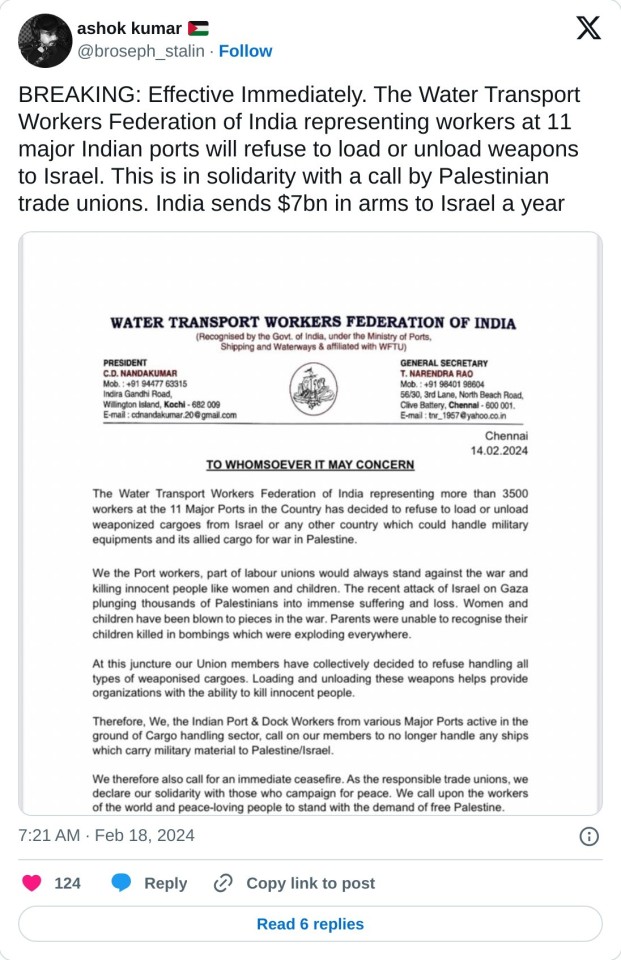



#yemen#jerusalem#tel aviv#current events#palestine#free palestine#gaza#free gaza#news on gaza#palestine news#news update#war news#war on gaza#india#boycott divest sanction#direct action#bds movement
15K notes
·
View notes
Text
"When a severe water shortage hit the Indian city of Kozhikode in the state of Kerala, a group of engineers turned to science fiction to keep the taps running.
Like everyone else in the city, engineering student Swapnil Shrivastav received a ration of two buckets of water a day collected from India’s arsenal of small water towers.
It was a ‘watershed’ moment for Shrivastav, who according to the BBC had won a student competition four years earlier on the subject of tackling water scarcity, and armed with a hypothetical template from the original Star Wars films, Shrivastav and two partners set to work harvesting water from the humid air.
“One element of inspiration was from Star Wars where there’s an air-to-water device. I thought why don’t we give it a try? It was more of a curiosity project,” he told the BBC.
According to ‘Wookiepedia’ a ‘moisture vaporator’ is a device used on moisture farms to capture water from a dry planet’s atmosphere, like Tatooine, where protagonist Luke Skywalker grew up.
This fictional device functions according to Star Wars lore by coaxing moisture from the air by means of refrigerated condensers, which generate low-energy ionization fields. Captured water is then pumped or gravity-directed into a storage cistern that adjusts its pH levels. Vaporators are capable of collecting 1.5 liters of water per day.

Pictured: Moisture vaporators on the largely abandoned Star Wars film set of Mos Espa, in Tunisia
If science fiction authors could come up with the particulars of such a device, Shrivastav must have felt his had a good chance of succeeding. He and colleagues Govinda Balaji and Venkatesh Raja founded Uravu Labs, a Bangalore-based startup in 2019.
Their initial offering is a machine that converts air to water using a liquid desiccant. Absorbing moisture from the air, sunlight or renewable energy heats the desiccant to around 100°F which releases the captured moisture into a chamber where it’s condensed into drinking water.
The whole process takes 12 hours but can produce a staggering 2,000 liters, or about 500 gallons of drinking-quality water per day. [Note: that IS staggering! That's huge!!] Uravu has since had to adjust course due to the cost of manufacturing and running the machines—it’s just too high for civic use with current materials technology.
“We had to shift to commercial consumption applications as they were ready to pay us and it’s a sustainability driver for them,” Shrivastav explained. This pivot has so far been enough to keep the start-up afloat, and they produce water for 40 different hospitality clients.
Looking ahead, Shrivastav, Raja, and Balaji are planning to investigate whether the desiccant can be made more efficient; can it work at a lower temperature to reduce running costs, or is there another material altogether that might prove more cost-effective?
They’re also looking at running their device attached to data centers in a pilot project that would see them utilize the waste heat coming off the centers to heat the desiccant."
-via Good News Network, May 30, 2024
#water#india#kerala#Kozhikode#science and technology#clean water#water access#drinking water#drought#climate change#climate crisis#climate action#climate adaptation#green tech#sustainability#water shortage#good news#hope#star wars#tatooine
1K notes
·
View notes
Text
She has not just been raped and murdered, she was very much tortured and brutalized like Nirbhaya. It is all over the Bengali news. I don't understand why no one is talking about this.
A 2nd year Respiratory Medicine in a well known government medical college in Kolkata, West Bengal, India is found in a semi-naked state and the college/ hospital called it a suicide.
I'm a MBBS student in second year. After reading about her, what crossed my mind is the amount of times she would have felt this fear, before this worst fear of hers eventually materialized.
"A young resident doctor was found dead in the seminar room of her medical college in Kolkata. Initial autopsy report suggests possible rape and murder."
As all are saying,
She wasn't walking the street at odd hours. She wasn't wearing clothes that were provocative. She wasn't loitering in dangerous neighbourhoods.
She was a resident doctor, looking for a place to rest in her own hospital.
She had been on duty and had gone to rest in the early hours of Friday.
The one place which was supposed to guarantee her safety failed her, miserably.
Someone comes, rapes a female pg who is merely resting in a seminar hall because there is no proper place for her to rest, brutalized her and kills her. How did NO one know? The college and police initially call it a suicide. Excuse me? It is also being said that under pressure from local politicians, the Principal and Dean attempted to alter the post-mortem report. Autopsy confirms sexual assault.
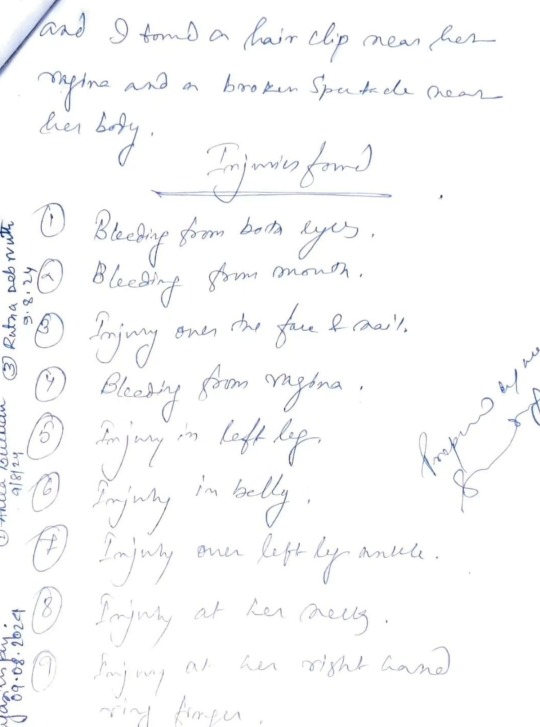
What are the actions taken? One man arrested because his behavior seemed "shady". This is clearly not an act of one man. And this was a very well aware of and a well executed criminal act.
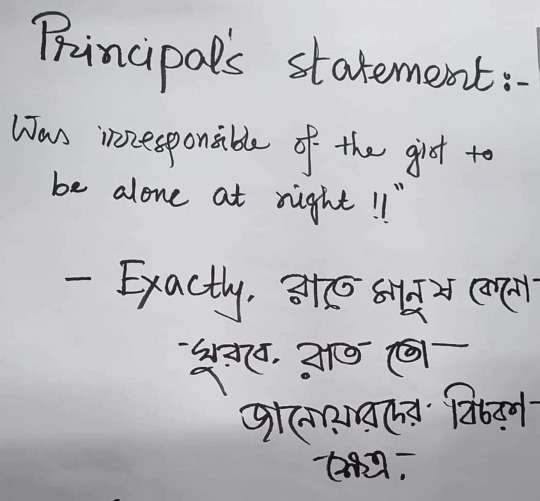
Also, all this happening in WB right when the situation of bangladesh is in turmoil and news of Bangladeshi Hindus being killed and tortured, seems wrong, VERY WRONG. Happening right before NEET-PG, as 24 lakh doctors prepare to write an exam on Sunday to be resident doctors, this news has wrapped us all in agony and rage,
What are they working so hard for? Why should they aspire to be in a system that ignores their basic needs? The minimum requirement of a workplace is safety. That should be non-negotiable.
This profession demands extereme hardwork, a lot of mental strength and Physical Assaults, harassment, low paying jobs with odd working hours with intense humiliation. Now its the worst of all seeing a bright mind losing her life in the most disrespectful state of all. This should never happen to any woman.
I'd also like to question why isn't any big media house covering this news, where are all the international news channels all this time.
What are the students in other medical colleges doing? This talks about their own safety and lives. What are the medical students across the world doing? It's time for us to stand for the most basic Human right, safety.
Yesterday when my roommate, an MBBS final year intern was heading for her night posting, I feared and prayed for her to come back safely. Thinking about it, in a few years I will also have night posting, I'll also return from my hospital duties late at night. I'll also have to go through the same fear, and I'll also have to keep praying that my worst fears don't turn into reality. So many female doctors, nursing staffs, other Healthcare workers, other working women, non-working women go through the same fear, probably multiple times a day.
It is a shame to be born in such a disgusting world and society, it is shame to witness such a brutal crime, and it is a shame to live in this fear daily.
Those RAPISTS need to be hunged infront of the whole natio...if needed burned alive. People should fear the idea of raping, more than getting raped.
#medicine#desi teen#desi tumblr#desi dark academia#desi things#desi girl#desi academia#desi#kolkata#west bengal#bengali#bangla news#bangla#indian#india#indian students#indian aesthetic#desi memes#desi culture#desi life#justice#justiceformoumitadebnath#nirbhaya#rape/noncon#not incorrect quotes#junko furuta#crimes against humanity#crime against humanity#crime against women#doctor
1K notes
·
View notes
Text
Delhi recorded an all-time high temperature of 52.9 degrees Celsius (127.22 Fahrenheit) on Wednesday (May 29) as extreme heat conditions gripped the north and western parts of India, causing students to faint in schools and drinking water taps to dry up.
A heat wave alert has been in place for large parts of India since last week but on Wednesday the temperature in Mungeshpur, a densely packed corner of Delhi, crossed the 50 C mark, the weather office said.
The Indian capital has had temperatures of over 45 C in previous years but never gone as high as 52.9 C.
Continue Reading
826 notes
·
View notes
Text

#narendra modi#desiblr#desi humor#desi girl#desi tag#being desi#desi memes#india elections#indian elections#elections#election 2024#bjp#anti bjp#Congress#desi tumblr#lol#.jpg#india news#indpol#indian politics
698 notes
·
View notes
Text

#free palestine#palestine#israel#news#colonialism#anti colonialism#democrats#republicans#politics#woc#poc#india
469 notes
·
View notes
Text
so far, nearly 3 weeks on from the inauguration of ram mandir, indian authorities have demolished as many masjids and/or madrasas.
30.01.24 - akhoonji masjid & madrasa in delhi, also destroying a cemetery, shrine and all the students’ belongings in the process.
01.02.24 - a madrasa in maharashtra despite facing opposition from local muslims and one day before its scheduled court appeal.
08.02.24 - a masjid & madrasa in uttarakhand. this comes one day after uttarakhand became the first state to pass the uniform civil code (x, x) which aims to apply a ‘hindu code’ to all indians, infringing on the rights of dalits, adivasis, sikhs, christians, buddhists and muslims (i.e. anybody non-hindu) to practice their religion/lifestyle. muslim women protesting the demolition were lathi-charged (beaten with sticks) by police, a shoot-on-sight order was given resulting in 6 muslims killed and 300+ injured in the riots that followed, a curfew was put in place during which hindutva mobs burned down muslim homes and businesses while shouting abuse at muslims.
as always, no prior notice was given and bjp used it’s gold-standard excuse for each demolition, citing ‘illegal encroachment’.
in addition to these masjid demolitions, indian authorities bulldozed 2 neighbourhoods (ghettos, really) in the same timeframe and also without prior notice:
01.02.24 - jasola slum, which, having been around for at least 16 years, should not have been demolished without providing alternative housing, as the delhi slum policy states for slums which came up before 2015. obviously, housing hasn’t been provided.
06.02.24 - panchsheel nagar in mumbai which, having been around since 2011, entitled residents to paid rehabilitation, which has also not been given. this has left over 110 families homeless.
the demographic of both neighbourhoods, surprise surprise, is overwhelmingly muslim, buddhist and dalit.
bjp is enjoying the cover it is receiving from israel’s genocide in palestine to do whatever it wants and is getting bolder by the day. this ‘bulldozer justice’ has been happening for years, but not at such a rapid rate as it is now.
#and bjp’s crimes are always underreported or not reported at all in mainstream news anyway#india#m#!
1K notes
·
View notes
Text
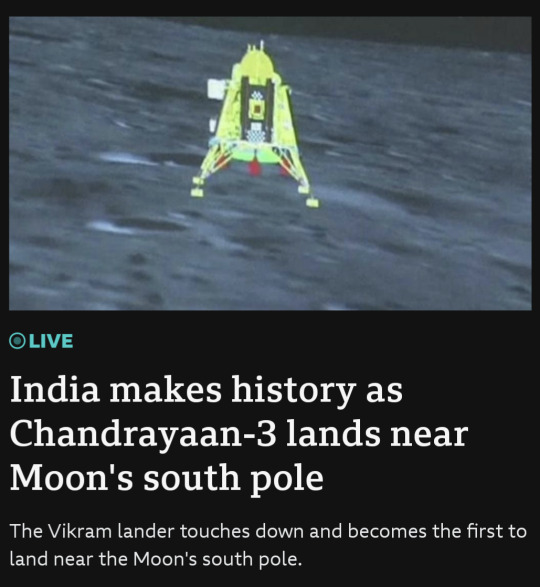
what an amazing day to be Indian ❤️ Congratulations to the physicists, engineers, scientists and all staff involved, this is outstanding 🎉
2K notes
·
View notes
Text
THE STUDENTS OF BANGLADESH ARE DYING.
The so called students league called BCL or Bangladesh Chatro league, who are basically the rabid dogs of the rolling government of Bangladesh are attacking, assaulting and killing the students protesting against the Quota system that gives off government jobs for the children and grandchildren of freedom fighters of the liberation war. Our own prime minister called us rajakar (traitor who betrayed Bangladesh to Pakistan in 1971) and said anyone who isn't the child of declared freedom fighter is a child of a rajakar. So the students created a slogan "who am I? Who are you? Rajakar, rajakar!" Ignoring the irony of the slogan, the pm set her rabid dogs on the students, my people are dying because she (pm) refuses to let go of nepotism. We can't use our freedom of speech. Please help us.
Our Internet is being cut off, our accounts are being hacked, our electricity is said to be gone soon. SPREAD THE WORD.

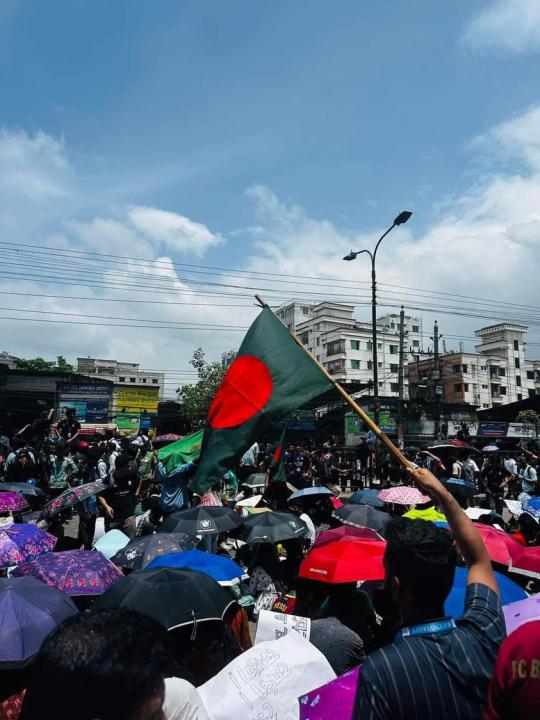








#bangladesh#desi#desiblr#international#news#from the river to the sea palestine will be free#palestine#all eyes on bangladesh#free congo#free sudan#bengali#west bengal#operation searchlight#banglablr#bangla#liberation war of 1971#infia#india#pakistan#quota movement#save bangladeshi students
319 notes
·
View notes
Text
For the ones unaware, an on-duty female doctor was brutally raped and murdered on the night of August 9th in India. There have been waves of mass protests all over the country regarding this issue.
The doctor, a junior resident working a 36 hours shift was resting in the hospital's seminar hall when she was subjected to this gruesome torment. Her body was found in an incomprehensible state half-naked in the same seminar hall the next morning.
I urge you to stand by truth. This is something no woman should face, after multiple years of studying and training, we do not enter this field to be subjected to inhumane treatment.
I was born to live.
I was born to dream.
I was born to achieve.
Any other human deserves the same chance at life that you and I do.
Don't let your silence become an enabling factor for inhumanity.
#rg kar medical college#kolkata doctor murder#annie one#india#desiblr#india news#spread awareness#desi side of tumblr#desi tumblr#feminism#justice#justice for the victim
365 notes
·
View notes
Text




#yemen#jerusalem#tel aviv#current events#palestine#free palestine#gaza#free gaza#news on gaza#palestine news#news update#war news#war on gaza#india#nuseirat refugee camp#unrwa#gaza genocide#genocide
3K notes
·
View notes
Text
Hindus are being gangraped, lynched, and having their property destroyed in Bangladesh rn. Amidst all the news coming out of there don't forget about the minority that always ends up dealing with the brunt of chaos. in 1971 most of the victims of the genocide were Bangladeshi Hindus and everyone conveniently leaves this detail out.
(And i know some mf will either no true scotsman this or say that it's all lies and that all the videos coming out are fake or propaganda from the BJP or something instead of another event in a long chain of violence. The Hindu population has crashed from 30% at independence to 9% today. Estimates say that in the next 30 years, Hindus will be extinct in Bangladesh)
#everyone loves supporting minorities and non-abrahamic belief systems until its hindus#then its silence from fucking everyone#bangladesh hating on india is lowk so funny like babe if it wasnt for their involvement in 1971 you people wouldn't even have your country#india#bangladesh#world news#hindu#indian tumblr#hinduism#hindublr#i want sheikh hasina back and not this fucking western puppet headass. fucking cold war shit
226 notes
·
View notes
Text
Indian Prime Minister Narendra Modi is, by some measures, the most popular leader in the world. Prior to the 2024 election, his Bharatiya Janata Party (BJP) held an outright majority in the Lok Sabha (India’s Parliament) — one that was widely projected to grow after the vote count. The party regularly boasted that it would win 400 Lok Sabha seats, easily enough to amend India’s constitution along the party's preferred Hindu nationalist lines.
But when the results were announced on Tuesday, the BJP held just 240 seats. They not only underperformed expectations, they actually lost their parliamentary majority. While Modi will remain prime minister, he will do so at the helm of a coalition government — meaning that he will depend on other parties to stay in office, making it harder to continue his ongoing assault on Indian democracy.
So what happened? Why did Indian voters deal a devastating blow to a prime minister who, by all measures, they mostly seem to like?
India is a massive country — the most populous in the world — and one of the most diverse, making its internal politics exceedingly complicated. A definitive assessment of the election would require granular data on voter breakdown across caste, class, linguistic, religious, age, and gender divides. At present, those numbers don’t exist in sufficient detail.
But after looking at the information that is available and speaking with several leading experts on Indian politics, there are at least three conclusions that I’m comfortable drawing.
First, voters punished Modi for putting his Hindu nationalist agenda ahead of fixing India’s unequal economy. Second, Indian voters had some real concerns about the decline of liberal democracy under BJP rule. Third, the opposition parties waged a smart campaign that took advantage of Modi’s vulnerabilities on the economy and democracy.
Understanding these factors isn’t just important for Indians. The country’s election has some universal lessons for how to beat a would-be authoritarian — ones that Americans especially might want to heed heading into its election in November.
-via Vox, June 7, 2024. Article continues below.
A new (and unequal) economy
Modi’s biggest and most surprising losses came in India’s two most populous states: Uttar Pradesh in the north and Maharashtra in the west. Both states had previously been BJP strongholds — places where the party’s core tactic of pitting the Hindu majority against the Muslim minority had seemingly cemented Hindu support for Modi and his allies.
One prominent Indian analyst, Yogendra Yadav, saw the cracks in advance. Swimming against the tide of Indian media, he correctly predicted that the BJP would fall short of a governing majority.
Traveling through the country, but especially rural Uttar Pradesh, he prophesied “the return of normal politics”: that Indian voters were no longer held spellbound by Modi’s charismatic nationalist appeals and were instead starting to worry about the way politics was affecting their lives.
Yadav’s conclusions derived in no small part from hearing voters’ concerns about the economy. The issue wasn’t GDP growth — India’s is the fastest-growing economy in the world — but rather the distribution of growth’s fruits. While some of Modi’s top allies struck it rich, many ordinary Indians suffered. Nearly half of all Indians between 20 and 24 are unemployed; Indian farmers have repeatedly protested Modi policies that they felt hurt their livelihoods.
“Everyone was talking about price rise, unemployment, the state of public services, the plight of farmers, [and] the struggles of labor,” Yadav wrote...
“We know for sure that Modi’s strongman image and brassy self-confidence were not as popular with voters as the BJP assumed,” says Sadanand Dhume, a senior fellow at the American Enterprise Institute who studies India.
The lesson here isn’t that the pocketbook concerns trump identity-based appeals everywhere; recent evidence in wealthier democracies suggests the opposite is true. Rather, it’s that even entrenched reputations of populist leaders are not unshakeable. When they make errors, even some time ago, it’s possible to get voters to remember these mistakes and prioritize them over whatever culture war the populist is peddling at the moment.
Liberalism strikes back
The Indian constitution is a liberal document: It guarantees equality of all citizens and enshrines measures designed to enshrine said equality into law. The signature goal of Modi’s time in power has been to rip this liberal edifice down and replace it with a Hindu nationalist model that pushes non-Hindus to the social margins. In pursuit of this agenda, the BJP has concentrated power in Modi’s hands and undermined key pillars of Indian democracy (like a free press and independent judiciary).
Prior to the election, there was a sense that Indian voters either didn’t much care about the assault on liberal democracy or mostly agreed with it. But the BJP’s surprising underperformance suggests otherwise.
The Hindu, a leading Indian newspaper, published an essential post-election data analysis breaking down what we know about the results. One of the more striking findings is that the opposition parties surged in parliamentary seats reserved for members of “scheduled castes” — the legal term for Dalits, the lowest caste grouping in the Hindu hierarchy.
Caste has long been an essential cleavage in Indian politics, with Dalits typically favoring the left-wing Congress party over the BJP (long seen as an upper-caste party). Under Modi, the BJP had seemingly tamped down on the salience of class by elevating all Hindus — including Dalits — over Muslims. Yet now it’s looking like Dalits were flocking back to Congress and its allies. Why?
According to experts, Dalit voters feared the consequences of a BJP landslide. If Modi’s party achieved its 400-seat target, they’d have more than enough votes to amend India’s constitution. Since the constitution contains several protections designed to promote Dalit equality — including a first-in-the-world affirmative action system — that seemed like a serious threat to the community. It seems, at least based on preliminary data, that they voted accordingly.
The Dalit vote is but one example of the ways in which Modi’s brazen willingness to assail Indian institutions likely alienated voters.
Uttar Pradesh (UP), India’s largest and most electorally important state, was the site of a major BJP anti-Muslim campaign. It unofficially kicked off its campaign in the UP city of Ayodhya earlier this year, during a ceremony celebrating one of Modi’s crowning achievements: the construction of a Hindu temple on the site of a former mosque that had been torn down by Hindu nationalists in 1992.
Yet not only did the BJP lose UP, it specifically lost the constituency — the city of Faizabad — in which the Ayodhya temple is located. It’s as direct an electoral rebuke to BJP ideology as one can imagine.
In Maharashtra, the second largest state, the BJP made a tactical alliance with a local politician, Ajit Pawar, facing serious corruption charges. Voters seemingly punished Modi’s party for turning a blind eye to Pawar’s offenses against the public trust. Across the country, Muslim voters turned out for the opposition to defend their rights against Modi’s attacks.
The global lesson here is clear: Even popular authoritarians can overreach.
By turning “400 seats” into a campaign slogan, an all-but-open signal that he intended to remake the Indian state in his illiberal image, Modi practically rang an alarm bell for constituencies worried about the consequences. So they turned out to stop him en masse.
The BJP’s electoral underperformance is, in no small part, the direct result of their leader’s zealotry going too far.
Return of the Gandhis?
Of course, Modi’s mistakes might not have mattered had his rivals failed to capitalize. The Indian opposition, however, was far more effective than most observers anticipated.
Perhaps most importantly, the many opposition parties coordinated with each other. Forming a united bloc called INDIA (Indian National Developmental Inclusive Alliance), they worked to make sure they weren’t stealing votes from each other in critical constituencies, positioning INDIA coalition candidates to win straight fights against BJP rivals.
The leading party in the opposition bloc — Congress — was also more put together than people thought. Its most prominent leader, Rahul Gandhi, was widely dismissed as a dilettante nepo baby: a pale imitation of his father Rajiv and grandmother Indira, both former Congress prime ministers. Now his critics are rethinking things.
“I owe Rahul Gandhi an apology because I seriously underestimated him,” says Manjari Miller, a senior fellow at the Council on Foreign Relations.
Miller singled out Gandhi’s yatras (marches) across India as a particularly canny tactic. These physically grueling voyages across the length and breadth of India showed that he wasn’t just a privileged son of Indian political royalty, but a politician willing to take risks and meet ordinary Indians where they were. During the yatras, he would meet directly with voters from marginalized groups and rail against Modi’s politics of hate.
“The persona he’s developed — as somebody kind, caring, inclusive, [and] resolute in the face of bullying — has really worked and captured the imagination of younger India,” says Suryanarayan. “If you’ve spent any time on Instagram Reels, [you’ll see] an entire generation now waking up to Rahul Gandhi’s very appealing videos.”
This, too, has a lesson for the rest of the world: Tactical innovation from the opposition matters even in an unfair electoral context.
There is no doubt that, in the past 10 years, the BJP stacked the political deck against its opponents. They consolidated control over large chunks of the national media, changed campaign finance law to favor themselves, suborned the famously independent Indian Electoral Commission, and even intimidated the Supreme Court into letting them get away with it.
The opposition, though, managed to find ways to compete even under unfair circumstances. Strategic coordination between them helped consolidate resources and ameliorate the BJP cash advantage. Direct voter outreach like the yatra helped circumvent BJP dominance in the national media.
To be clear, the opposition still did not win a majority. Modi will have a third term in office, likely thanks in large part to the ways he rigged the system in his favor.
Yet there is no doubt that the opposition deserves to celebrate. Modi’s power has been constrained and the myth of his invincibility wounded, perhaps mortally. Indian voters, like those in Brazil and Poland before them, have dealt a major blow to their homegrown authoritarian faction.
And that is something worth celebrating.
-via Vox, June 7, 2024.
#india#narendra modi#pm modi#modi#bjp#lok sabha elections#rahul gandhi#democracy#2024 elections#authoritarianism#anti authoritarian#good news#hope
721 notes
·
View notes
Text
Saw some old vines and got inspired:
So here y'all go, Spiderverse as Vines!
#am I late? maybe#but better late than never#getting used to use a new video editor so this was a good exercise for that#some of these might be a reach but I had fun making them so I included them anyways#okay now who to tag...#hobie brown#spider punk#miles morales#spider man#miguel o'hara#spider man 2099#gwen stacy#spider gwen#peter b parker#pavitr prabhakar#spider man india#LYLA#hope this post shows up in the tags cause usually tumblr won't let my video posts show up there for some reason#across the spider verse#atsv#spiderverse#vine#my video#my post
420 notes
·
View notes
Text
At least 33 Indian polling staff died on the last day of voting from heatstroke in just one state, says a top election official, after scorching temperatures gripped swaths of the country.
Navdeep Rinwa, chief electoral officer for the northern state of Uttar Pradesh, where voting in the seventh and final stage of the election ended on Saturday, said 33 polling personnel died due to the heat.
The figure included security guards and sanitation staff.
“A monetary compensation of 1.5 million rupees [$18,000] will be provided to the families of the deceased,” Rinwa told reporters on Sunday (Jun 2).
Continue Reading
596 notes
·
View notes
Text
if I see any racism directed to yerin…. STAND BEHIND ME GIRL

#so many weirdos in this fandom#attacking rege simone masali charithra and india to this DAY#give it a rest#even god rested on the sabbath#bridgerton#sophie beckett#benedict bridgerton#casting news#bridgerton season 4#benophie#yerin ha#luke thompson
286 notes
·
View notes